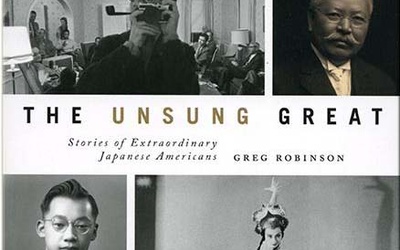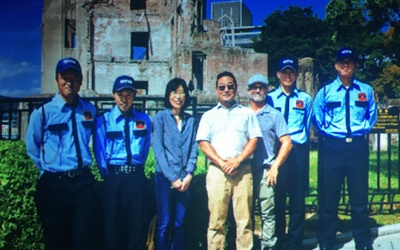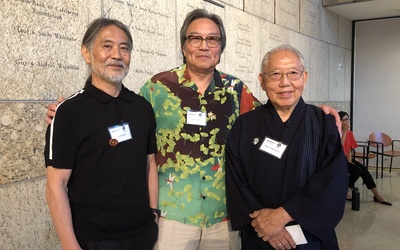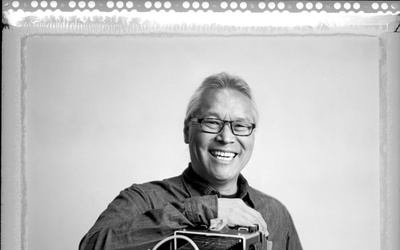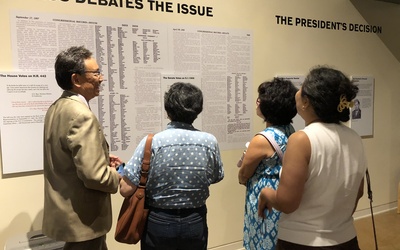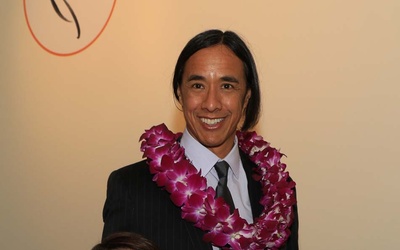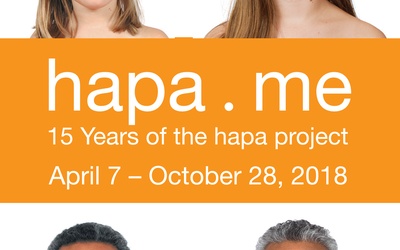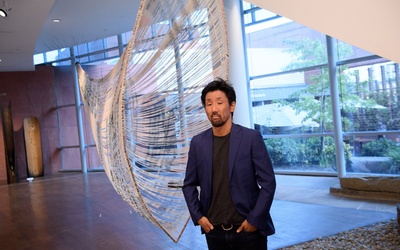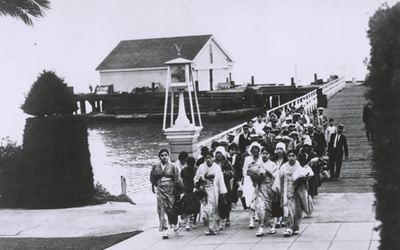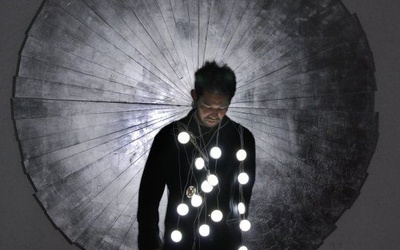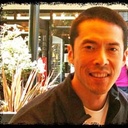
Darryl Mori
@DMoDarryl Mori is a writer based in Los Angeles, specializing in the arts and the nonprofit sector. A Sansei and a native of Southern California, he has written for UCLA and the Japanese American National Museum, where he serves as a volunteer. He currently works in fundraising and external relations for Art Center College of Design.
Updated December 2012
Stories from This Author
Stories of The Unsung Great: Author Greg Robinson on Exploring Japanese American History
May 28, 2021 • Darryl Mori
“I have told many times the story of how years ago I came across some of Franklin D. Roosevelt's writings from the 1920s, in which he endorsed legal discrimination against Japanese immigrants on the grounds that it helped preserve white ‘racial purity’ against interracial marriage,” scholar and author Greg Robinson recalls. “It was a great shock to me, and started me thinking about his role in Executive Order 9066.” For Robinson, a historian by training, the discovery motivated him to …
Echoes of History: Sound Artist Alan Nakagawa and the Hiroshima Legacy
March 10, 2020 • Darryl Mori
“You could feel everyone in the park staring,” Alan Nakagawa says. “Why do they get to go in the Dome? It was like being a goldfish in a goldfish bowl. However, the moment we were inside, having only an hour of access, we went straight to work.” The Los Angeles native recalls the day he and videographer Tom Clancey walked into the Atomic Bomb Dome in Hiroshima, Japan. The iconic structure, a UNESCO World Heritage Site, is the half-destroyed ruin …
Visual Communications and 50 Years of Asian Pacific American Stories
July 30, 2019 • Darryl Mori
“Growing up in the 1950s and early 1960s, we were subjected to stereotypical portraits or invisibility,” Eddie Wong recalls. “We knew we could make a difference by providing an alternative in the form of books, photo exhibits, and eventually films and video.” Wong, together with colleagues Duane Kubo, Robert (Bob) Nakamura and Alan Ohashi, started Visual Communications (VC) in 1970—a pioneering nonprofit organization dedicated to supporting Asian American and Pacific Islander filmmakers and media artists. In anticipation of the 50th …
Faces of Civil Rights, Then and Now: Paul Kitagaki Jr.'s Gambatte! Project
Jan. 24, 2019 • Darryl Mori
“The faces from the photographs staring up at me as I searched for my family in the National Archives have always haunted me,” Paul Kitagaki Jr., recalls. “I wanted to know the story behind the faces and discover how they survived and created a new life after the war.” The noted photographer and videographer—a Sansei whose work has been honored with dozens of awards, including the Pulitzer Prize—had family members who had been unjustly incarcerated in American concentration camps during …
Commemorating a Justice Landmark: 30 Years of the Civil Liberties Act of 1988
Dec. 12, 2018 • Darryl Mori
It took just seconds for U.S. President Ronald Reagan to sign the document. Yet the journey to that moment spanned more than four decades. The Civil Liberties Act of 1988 was the culmination of a multiyear movement to seek justice for Japanese Americans forced to live in wartime concentration camps solely because of their Japanese ancestry. After Reagan signed it into law, the Act granted reparations of $20,000 and a formal presidential apology to every surviving U.S. citizen or legal …
Q&A with Artist Kip Fulbeck: The Continuing Legacy of The Hapa Project - Part 2
June 28, 2018 • Darryl Mori
Read Part 1 >> DN: Now that you’re a parent, are the conversations about identity you may have had with your kids similar or different than those you may have had with your own parents? Or a little of both? KF: Ha! That assumes I ever had a single conversation about identity with my parents! I remember after I did Banana Split (my first film of note) and showed my parents. We watched it together, and afterwards both of them …
Q&A with Artist Kip Fulbeck: The Continuing Legacy of The Hapa Project - Part 1
June 27, 2018 • Darryl Mori
Artist/writer/performer Kip Fulbeck launched The Hapa Project in 2001, photographing more than 1,200 people of mixed Asian or Pacific Islander heritage. His intent was to raise awareness and understanding of multiracial people and to help them (especially children) form positive self-identities. The work led to a landmark book and related exhibition in 2006: kip fulbeck: part asian, 100% hapa. In the years since, he has spawned multiple books and exhibitions, spoken throughout the U.S. and abroad, and had his work …
Transpacific Borderlands: Behind the Scenes with Artist Shinpei Takeda
Feb. 2, 2018 • Darryl Mori
“Some people think my work looks like it’s speaking something like a megaphone,” says Shinpei Takeda. “And some people think it is trying to catch something, like a fishnet. Completely different. But I like that it can be both.” For Takeda, bridging disparate perspectives is nothing new. A visual artist and filmmaker who works across a wide range of media—such as film, photography, sound, performance, paint, fiber, calligraphy—he appreciates variety. But Takeda also brings a distinctive view of the breadth …
Finding Asian American Family Histories: Genealogist Marisa Louie Lee
July 17, 2017 • Darryl Mori
“I will never forget seeing my great-grandfather’s photograph in his immigration case file,” Marisa Louie Lee recalls. “The moment I opened the folder and saw the spitting image of my grandfather in front of me, I knew it was him. I cried in the research room!” For Lee, a researcher and genealogist, exploring family histories has a lot of personal meaning. “I have always been my family’s de facto ‘family historian,’ starting with the family newsletter I wrote and edited …
Mike Saijo: Remaking the Rules Through Art
March 23, 2017 • Darryl Mori
Mike Saijo vividly recalls the day art changed his life. “After college I went on a road trip as a ‘carnie,’ a carnival worker, to Northern California, Oregon, and Washington,” Saijo says. “After being on the road for eight months, I stopped off at Weed, California, in a campground, and had an emotional breakdown.” “I had reached a fork in the road where I felt I had to make a decision, either remain a carnie or dedicate my life to …

